An In-Depth Analysis of Management Practices and Theories at Coca-Cola
VerifiedAdded on 2021/08/30
|18
|3103
|163
Report
AI Summary
This report provides a comprehensive analysis of the Coca-Cola Company's management practices, encompassing strategic, operational, and tactical levels. It explores the roles and responsibilities of strategic, operational, and tactical managers, highlighting the skills essential for success in each position. The report delves into the application of various management theories, including behavioral theory, within the context of Coca-Cola's organizational structure. Furthermore, it examines the different levels of management within the company, from top-level executives to lower-level supervisors, detailing their respective functions and contributions to the overall organizational goals. The analysis incorporates insights from interviews with Coca-Cola managers, providing real-world perspectives on the challenges and strategies employed in managing a global beverage giant. The report emphasizes the importance of effective communication, decision-making, and adaptability in navigating the competitive landscape of the industry.
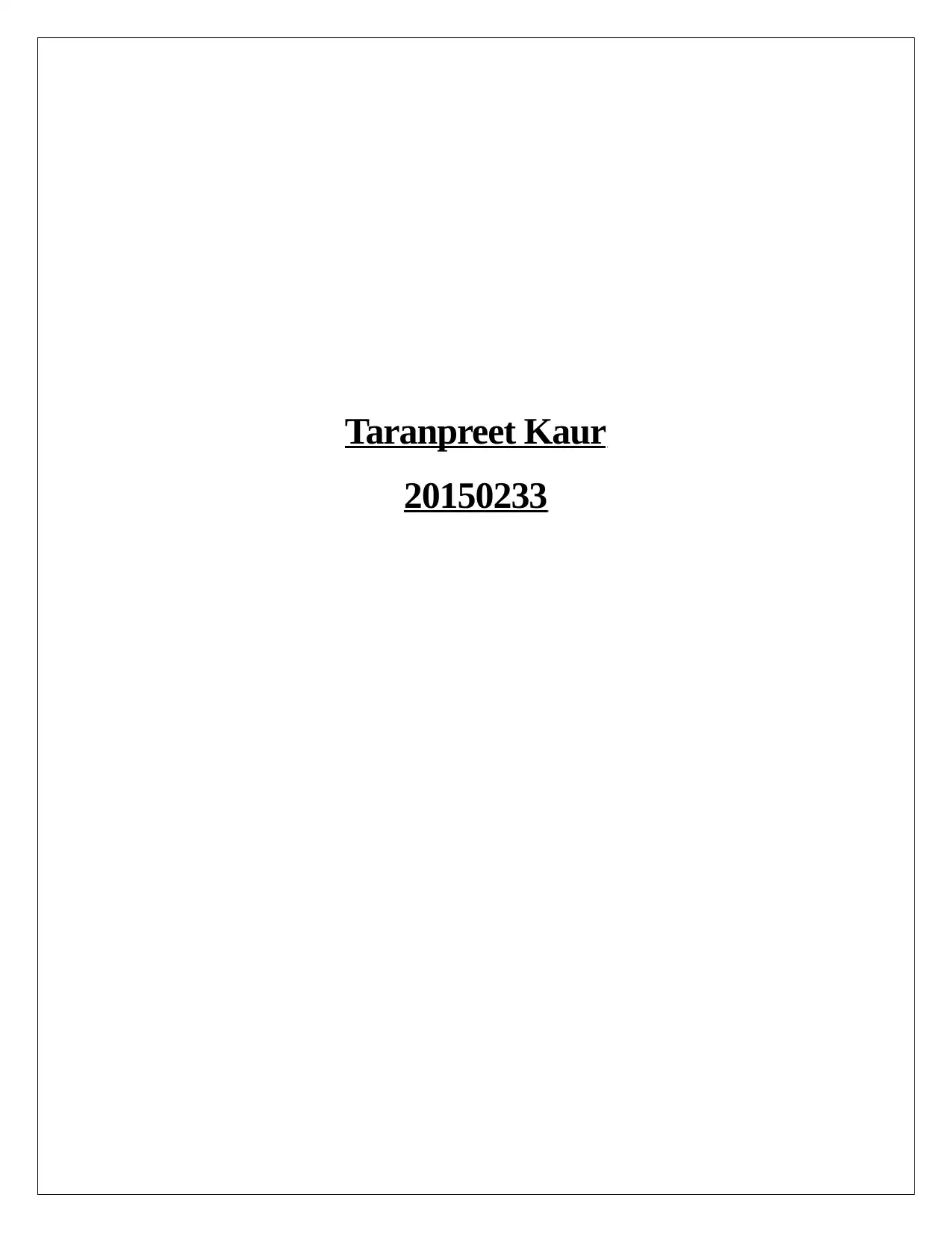
Taranpreet Kaur
20150233
20150233
Paraphrase This Document
Need a fresh take? Get an instant paraphrase of this document with our AI Paraphraser
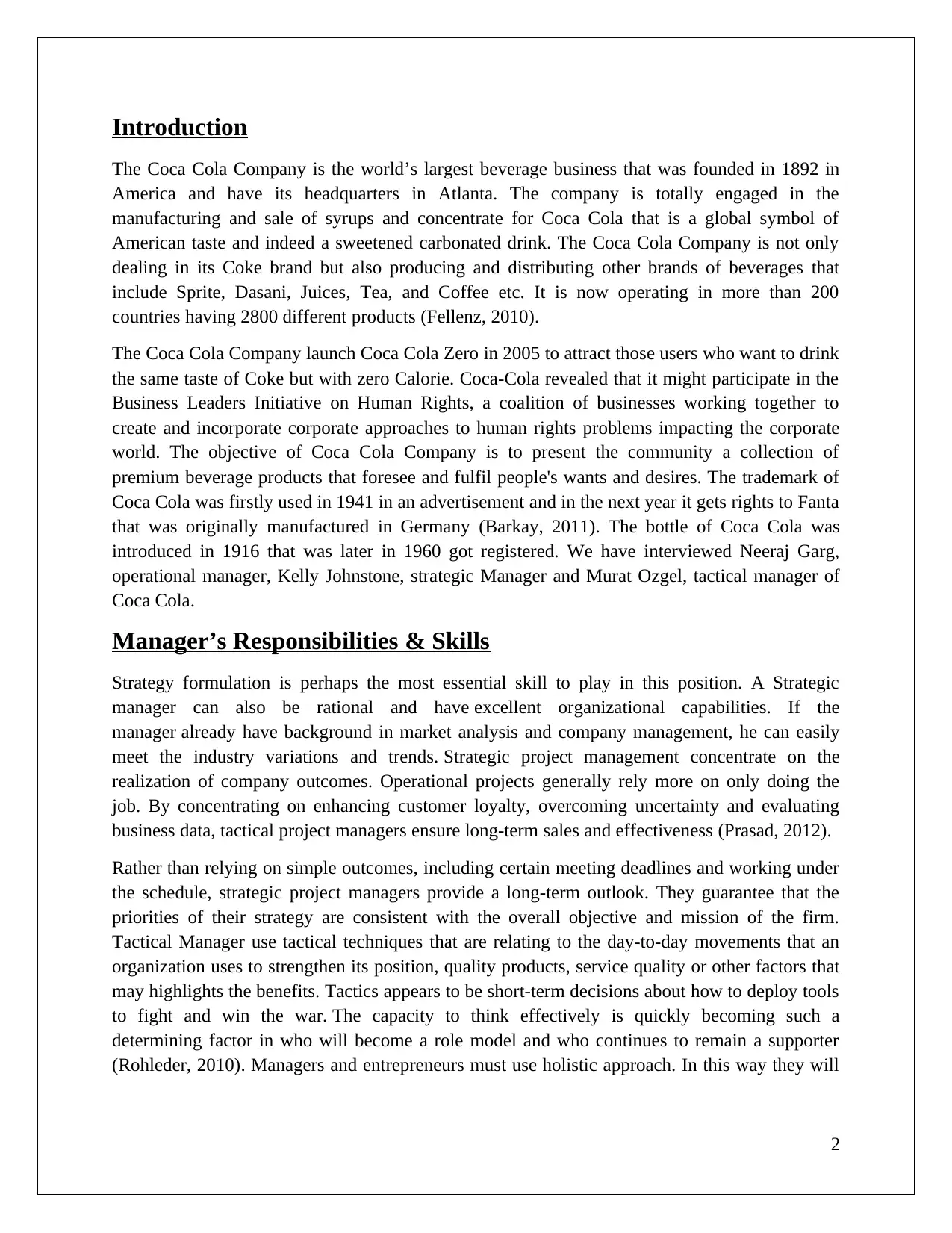
Introduction
The Coca Cola Company is the world’s largest beverage business that was founded in 1892 in
America and have its headquarters in Atlanta. The company is totally engaged in the
manufacturing and sale of syrups and concentrate for Coca Cola that is a global symbol of
American taste and indeed a sweetened carbonated drink. The Coca Cola Company is not only
dealing in its Coke brand but also producing and distributing other brands of beverages that
include Sprite, Dasani, Juices, Tea, and Coffee etc. It is now operating in more than 200
countries having 2800 different products (Fellenz, 2010).
The Coca Cola Company launch Coca Cola Zero in 2005 to attract those users who want to drink
the same taste of Coke but with zero Calorie. Coca-Cola revealed that it might participate in the
Business Leaders Initiative on Human Rights, a coalition of businesses working together to
create and incorporate corporate approaches to human rights problems impacting the corporate
world. The objective of Coca Cola Company is to present the community a collection of
premium beverage products that foresee and fulfil people's wants and desires. The trademark of
Coca Cola was firstly used in 1941 in an advertisement and in the next year it gets rights to Fanta
that was originally manufactured in Germany (Barkay, 2011). The bottle of Coca Cola was
introduced in 1916 that was later in 1960 got registered. We have interviewed Neeraj Garg,
operational manager, Kelly Johnstone, strategic Manager and Murat Ozgel, tactical manager of
Coca Cola.
Manager’s Responsibilities & Skills
Strategy formulation is perhaps the most essential skill to play in this position. A Strategic
manager can also be rational and have excellent organizational capabilities. If the
manager already have background in market analysis and company management, he can easily
meet the industry variations and trends. Strategic project management concentrate on the
realization of company outcomes. Operational projects generally rely more on only doing the
job. By concentrating on enhancing customer loyalty, overcoming uncertainty and evaluating
business data, tactical project managers ensure long-term sales and effectiveness (Prasad, 2012).
Rather than relying on simple outcomes, including certain meeting deadlines and working under
the schedule, strategic project managers provide a long-term outlook. They guarantee that the
priorities of their strategy are consistent with the overall objective and mission of the firm.
Tactical Manager use tactical techniques that are relating to the day-to-day movements that an
organization uses to strengthen its position, quality products, service quality or other factors that
may highlights the benefits. Tactics appears to be short-term decisions about how to deploy tools
to fight and win the war. The capacity to think effectively is quickly becoming such a
determining factor in who will become a role model and who continues to remain a supporter
(Rohleder, 2010). Managers and entrepreneurs must use holistic approach. In this way they will
2
The Coca Cola Company is the world’s largest beverage business that was founded in 1892 in
America and have its headquarters in Atlanta. The company is totally engaged in the
manufacturing and sale of syrups and concentrate for Coca Cola that is a global symbol of
American taste and indeed a sweetened carbonated drink. The Coca Cola Company is not only
dealing in its Coke brand but also producing and distributing other brands of beverages that
include Sprite, Dasani, Juices, Tea, and Coffee etc. It is now operating in more than 200
countries having 2800 different products (Fellenz, 2010).
The Coca Cola Company launch Coca Cola Zero in 2005 to attract those users who want to drink
the same taste of Coke but with zero Calorie. Coca-Cola revealed that it might participate in the
Business Leaders Initiative on Human Rights, a coalition of businesses working together to
create and incorporate corporate approaches to human rights problems impacting the corporate
world. The objective of Coca Cola Company is to present the community a collection of
premium beverage products that foresee and fulfil people's wants and desires. The trademark of
Coca Cola was firstly used in 1941 in an advertisement and in the next year it gets rights to Fanta
that was originally manufactured in Germany (Barkay, 2011). The bottle of Coca Cola was
introduced in 1916 that was later in 1960 got registered. We have interviewed Neeraj Garg,
operational manager, Kelly Johnstone, strategic Manager and Murat Ozgel, tactical manager of
Coca Cola.
Manager’s Responsibilities & Skills
Strategy formulation is perhaps the most essential skill to play in this position. A Strategic
manager can also be rational and have excellent organizational capabilities. If the
manager already have background in market analysis and company management, he can easily
meet the industry variations and trends. Strategic project management concentrate on the
realization of company outcomes. Operational projects generally rely more on only doing the
job. By concentrating on enhancing customer loyalty, overcoming uncertainty and evaluating
business data, tactical project managers ensure long-term sales and effectiveness (Prasad, 2012).
Rather than relying on simple outcomes, including certain meeting deadlines and working under
the schedule, strategic project managers provide a long-term outlook. They guarantee that the
priorities of their strategy are consistent with the overall objective and mission of the firm.
Tactical Manager use tactical techniques that are relating to the day-to-day movements that an
organization uses to strengthen its position, quality products, service quality or other factors that
may highlights the benefits. Tactics appears to be short-term decisions about how to deploy tools
to fight and win the war. The capacity to think effectively is quickly becoming such a
determining factor in who will become a role model and who continues to remain a supporter
(Rohleder, 2010). Managers and entrepreneurs must use holistic approach. In this way they will
2
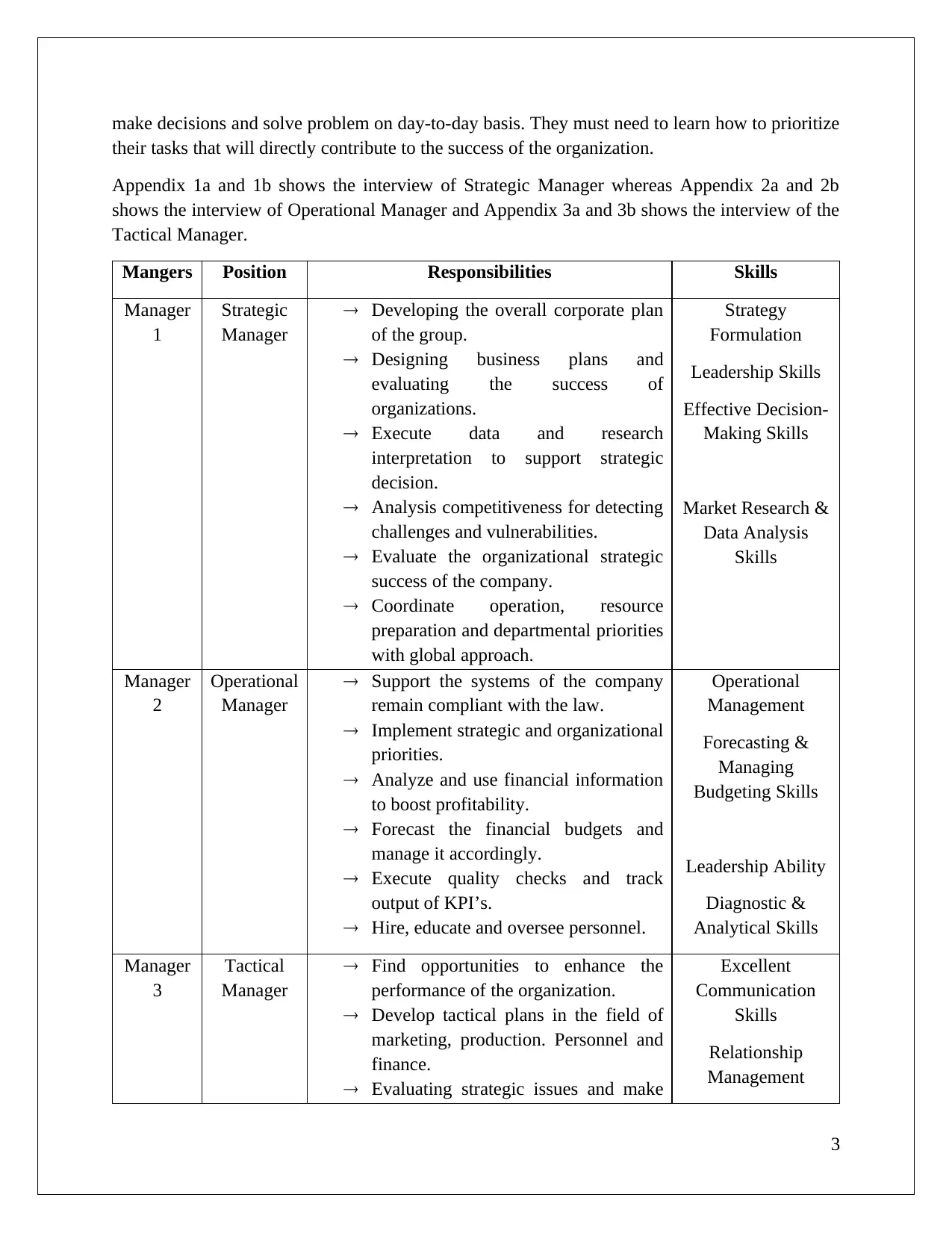
make decisions and solve problem on day-to-day basis. They must need to learn how to prioritize
their tasks that will directly contribute to the success of the organization.
Appendix 1a and 1b shows the interview of Strategic Manager whereas Appendix 2a and 2b
shows the interview of Operational Manager and Appendix 3a and 3b shows the interview of the
Tactical Manager.
Mangers Position Responsibilities Skills
Manager
1
Strategic
Manager
Developing the overall corporate plan
of the group.
Designing business plans and
evaluating the success of
organizations.
Execute data and research
interpretation to support strategic
decision.
Analysis competitiveness for detecting
challenges and vulnerabilities.
Evaluate the organizational strategic
success of the company.
Coordinate operation, resource
preparation and departmental priorities
with global approach.
Strategy
Formulation
Leadership Skills
Effective Decision-
Making Skills
Market Research &
Data Analysis
Skills
Manager
2
Operational
Manager
Support the systems of the company
remain compliant with the law.
Implement strategic and organizational
priorities.
Analyze and use financial information
to boost profitability.
Forecast the financial budgets and
manage it accordingly.
Execute quality checks and track
output of KPI’s.
Hire, educate and oversee personnel.
Operational
Management
Forecasting &
Managing
Budgeting Skills
Leadership Ability
Diagnostic &
Analytical Skills
Manager
3
Tactical
Manager
Find opportunities to enhance the
performance of the organization.
Develop tactical plans in the field of
marketing, production. Personnel and
finance.
Evaluating strategic issues and make
Excellent
Communication
Skills
Relationship
Management
3
their tasks that will directly contribute to the success of the organization.
Appendix 1a and 1b shows the interview of Strategic Manager whereas Appendix 2a and 2b
shows the interview of Operational Manager and Appendix 3a and 3b shows the interview of the
Tactical Manager.
Mangers Position Responsibilities Skills
Manager
1
Strategic
Manager
Developing the overall corporate plan
of the group.
Designing business plans and
evaluating the success of
organizations.
Execute data and research
interpretation to support strategic
decision.
Analysis competitiveness for detecting
challenges and vulnerabilities.
Evaluate the organizational strategic
success of the company.
Coordinate operation, resource
preparation and departmental priorities
with global approach.
Strategy
Formulation
Leadership Skills
Effective Decision-
Making Skills
Market Research &
Data Analysis
Skills
Manager
2
Operational
Manager
Support the systems of the company
remain compliant with the law.
Implement strategic and organizational
priorities.
Analyze and use financial information
to boost profitability.
Forecast the financial budgets and
manage it accordingly.
Execute quality checks and track
output of KPI’s.
Hire, educate and oversee personnel.
Operational
Management
Forecasting &
Managing
Budgeting Skills
Leadership Ability
Diagnostic &
Analytical Skills
Manager
3
Tactical
Manager
Find opportunities to enhance the
performance of the organization.
Develop tactical plans in the field of
marketing, production. Personnel and
finance.
Evaluating strategic issues and make
Excellent
Communication
Skills
Relationship
Management
3
⊘ This is a preview!⊘
Do you want full access?
Subscribe today to unlock all pages.

Trusted by 1+ million students worldwide
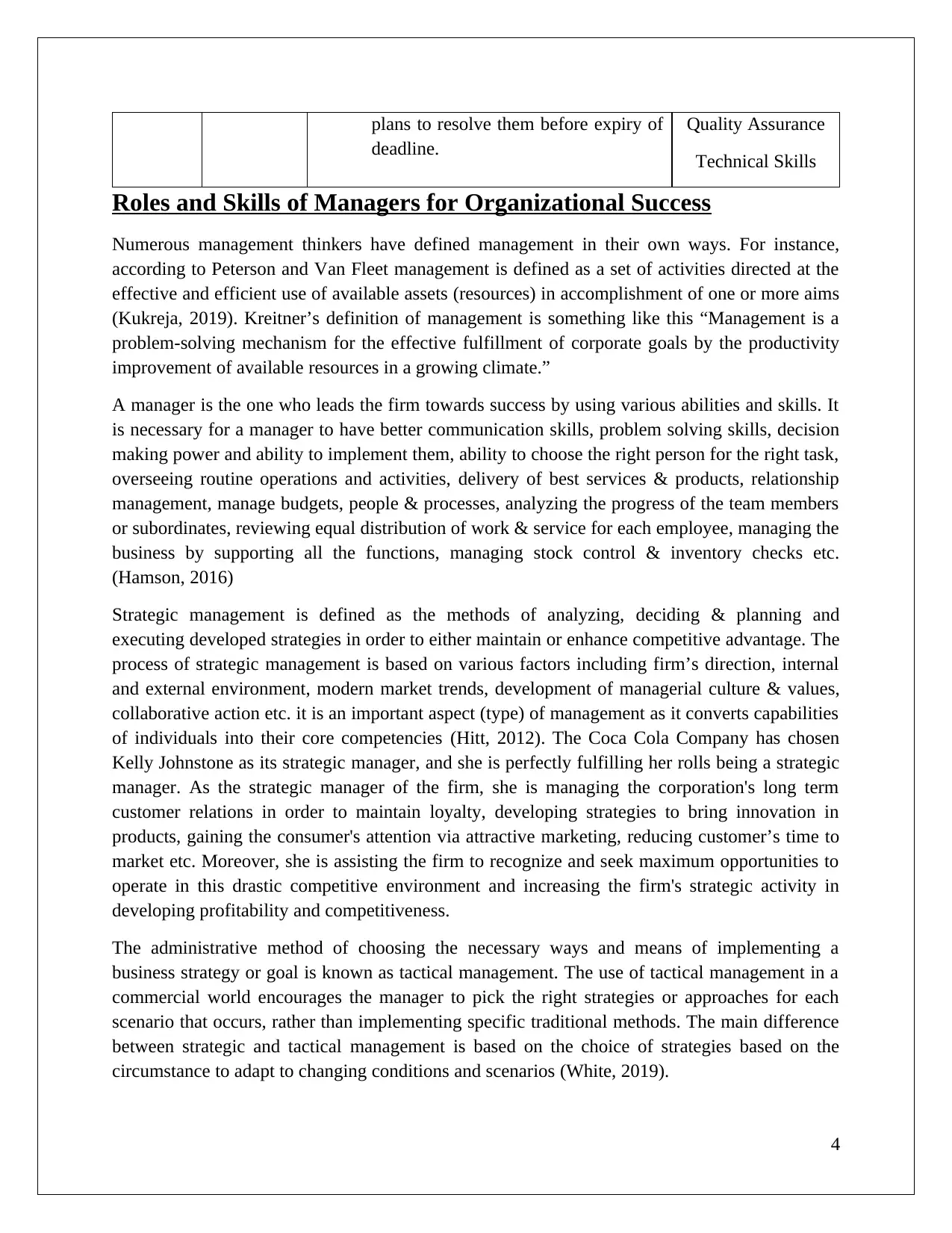
plans to resolve them before expiry of
deadline.
Quality Assurance
Technical Skills
Roles and Skills of Managers for Organizational Success
Numerous management thinkers have defined management in their own ways. For instance,
according to Peterson and Van Fleet management is defined as a set of activities directed at the
effective and efficient use of available assets (resources) in accomplishment of one or more aims
(Kukreja, 2019). Kreitner’s definition of management is something like this “Management is a
problem-solving mechanism for the effective fulfillment of corporate goals by the productivity
improvement of available resources in a growing climate.”
A manager is the one who leads the firm towards success by using various abilities and skills. It
is necessary for a manager to have better communication skills, problem solving skills, decision
making power and ability to implement them, ability to choose the right person for the right task,
overseeing routine operations and activities, delivery of best services & products, relationship
management, manage budgets, people & processes, analyzing the progress of the team members
or subordinates, reviewing equal distribution of work & service for each employee, managing the
business by supporting all the functions, managing stock control & inventory checks etc.
(Hamson, 2016)
Strategic management is defined as the methods of analyzing, deciding & planning and
executing developed strategies in order to either maintain or enhance competitive advantage. The
process of strategic management is based on various factors including firm’s direction, internal
and external environment, modern market trends, development of managerial culture & values,
collaborative action etc. it is an important aspect (type) of management as it converts capabilities
of individuals into their core competencies (Hitt, 2012). The Coca Cola Company has chosen
Kelly Johnstone as its strategic manager, and she is perfectly fulfilling her rolls being a strategic
manager. As the strategic manager of the firm, she is managing the corporation's long term
customer relations in order to maintain loyalty, developing strategies to bring innovation in
products, gaining the consumer's attention via attractive marketing, reducing customer’s time to
market etc. Moreover, she is assisting the firm to recognize and seek maximum opportunities to
operate in this drastic competitive environment and increasing the firm's strategic activity in
developing profitability and competitiveness.
The administrative method of choosing the necessary ways and means of implementing a
business strategy or goal is known as tactical management. The use of tactical management in a
commercial world encourages the manager to pick the right strategies or approaches for each
scenario that occurs, rather than implementing specific traditional methods. The main difference
between strategic and tactical management is based on the choice of strategies based on the
circumstance to adapt to changing conditions and scenarios (White, 2019).
4
deadline.
Quality Assurance
Technical Skills
Roles and Skills of Managers for Organizational Success
Numerous management thinkers have defined management in their own ways. For instance,
according to Peterson and Van Fleet management is defined as a set of activities directed at the
effective and efficient use of available assets (resources) in accomplishment of one or more aims
(Kukreja, 2019). Kreitner’s definition of management is something like this “Management is a
problem-solving mechanism for the effective fulfillment of corporate goals by the productivity
improvement of available resources in a growing climate.”
A manager is the one who leads the firm towards success by using various abilities and skills. It
is necessary for a manager to have better communication skills, problem solving skills, decision
making power and ability to implement them, ability to choose the right person for the right task,
overseeing routine operations and activities, delivery of best services & products, relationship
management, manage budgets, people & processes, analyzing the progress of the team members
or subordinates, reviewing equal distribution of work & service for each employee, managing the
business by supporting all the functions, managing stock control & inventory checks etc.
(Hamson, 2016)
Strategic management is defined as the methods of analyzing, deciding & planning and
executing developed strategies in order to either maintain or enhance competitive advantage. The
process of strategic management is based on various factors including firm’s direction, internal
and external environment, modern market trends, development of managerial culture & values,
collaborative action etc. it is an important aspect (type) of management as it converts capabilities
of individuals into their core competencies (Hitt, 2012). The Coca Cola Company has chosen
Kelly Johnstone as its strategic manager, and she is perfectly fulfilling her rolls being a strategic
manager. As the strategic manager of the firm, she is managing the corporation's long term
customer relations in order to maintain loyalty, developing strategies to bring innovation in
products, gaining the consumer's attention via attractive marketing, reducing customer’s time to
market etc. Moreover, she is assisting the firm to recognize and seek maximum opportunities to
operate in this drastic competitive environment and increasing the firm's strategic activity in
developing profitability and competitiveness.
The administrative method of choosing the necessary ways and means of implementing a
business strategy or goal is known as tactical management. The use of tactical management in a
commercial world encourages the manager to pick the right strategies or approaches for each
scenario that occurs, rather than implementing specific traditional methods. The main difference
between strategic and tactical management is based on the choice of strategies based on the
circumstance to adapt to changing conditions and scenarios (White, 2019).
4
Paraphrase This Document
Need a fresh take? Get an instant paraphrase of this document with our AI Paraphraser
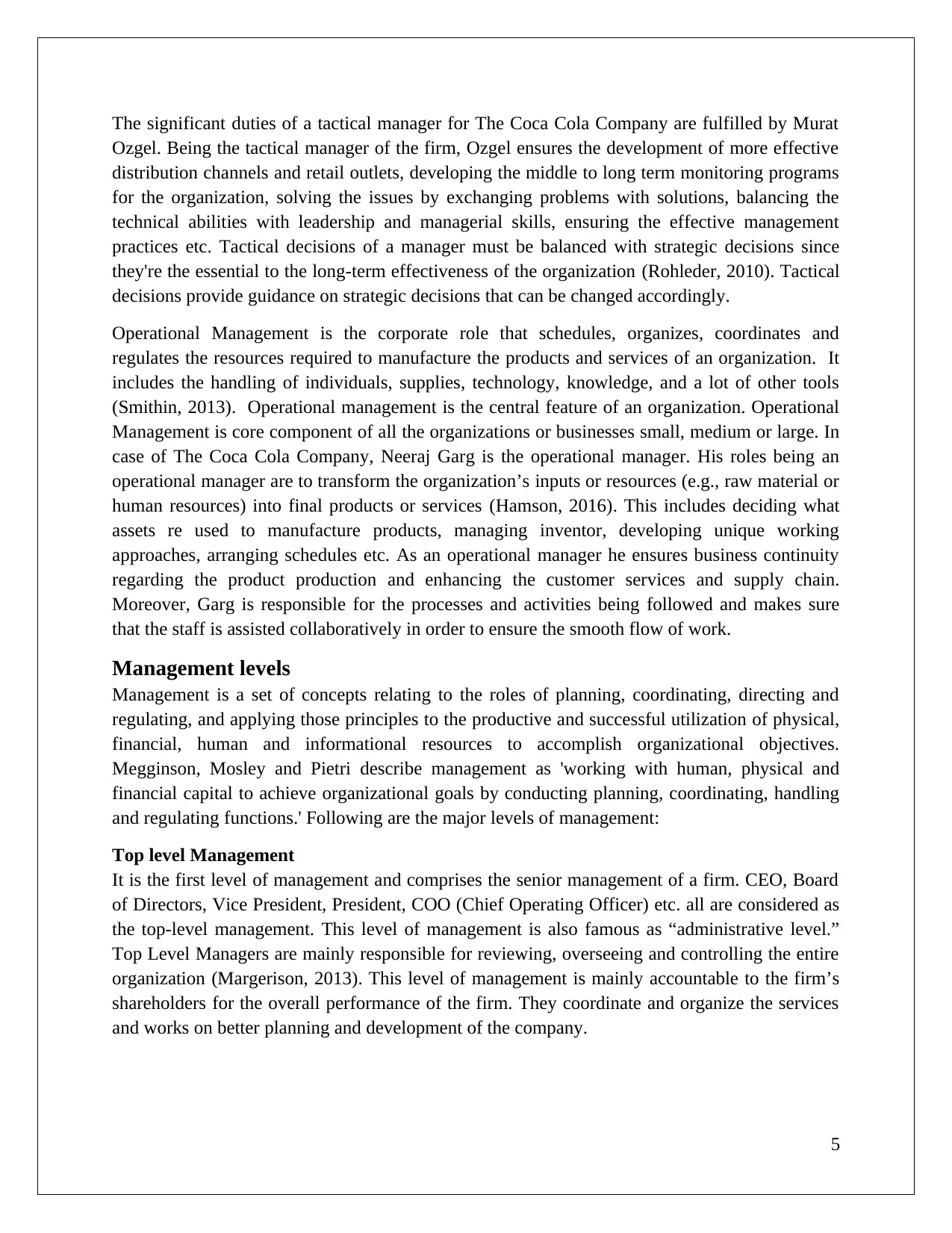
The significant duties of a tactical manager for The Coca Cola Company are fulfilled by Murat
Ozgel. Being the tactical manager of the firm, Ozgel ensures the development of more effective
distribution channels and retail outlets, developing the middle to long term monitoring programs
for the organization, solving the issues by exchanging problems with solutions, balancing the
technical abilities with leadership and managerial skills, ensuring the effective management
practices etc. Tactical decisions of a manager must be balanced with strategic decisions since
they're the essential to the long-term effectiveness of the organization (Rohleder, 2010). Tactical
decisions provide guidance on strategic decisions that can be changed accordingly.
Operational Management is the corporate role that schedules, organizes, coordinates and
regulates the resources required to manufacture the products and services of an organization. It
includes the handling of individuals, supplies, technology, knowledge, and a lot of other tools
(Smithin, 2013). Operational management is the central feature of an organization. Operational
Management is core component of all the organizations or businesses small, medium or large. In
case of The Coca Cola Company, Neeraj Garg is the operational manager. His roles being an
operational manager are to transform the organization’s inputs or resources (e.g., raw material or
human resources) into final products or services (Hamson, 2016). This includes deciding what
assets re used to manufacture products, managing inventor, developing unique working
approaches, arranging schedules etc. As an operational manager he ensures business continuity
regarding the product production and enhancing the customer services and supply chain.
Moreover, Garg is responsible for the processes and activities being followed and makes sure
that the staff is assisted collaboratively in order to ensure the smooth flow of work.
Management levels
Management is a set of concepts relating to the roles of planning, coordinating, directing and
regulating, and applying those principles to the productive and successful utilization of physical,
financial, human and informational resources to accomplish organizational objectives.
Megginson, Mosley and Pietri describe management as 'working with human, physical and
financial capital to achieve organizational goals by conducting planning, coordinating, handling
and regulating functions.' Following are the major levels of management:
Top level Management
It is the first level of management and comprises the senior management of a firm. CEO, Board
of Directors, Vice President, President, COO (Chief Operating Officer) etc. all are considered as
the top-level management. This level of management is also famous as “administrative level.”
Top Level Managers are mainly responsible for reviewing, overseeing and controlling the entire
organization (Margerison, 2013). This level of management is mainly accountable to the firm’s
shareholders for the overall performance of the firm. They coordinate and organize the services
and works on better planning and development of the company.
5
Ozgel. Being the tactical manager of the firm, Ozgel ensures the development of more effective
distribution channels and retail outlets, developing the middle to long term monitoring programs
for the organization, solving the issues by exchanging problems with solutions, balancing the
technical abilities with leadership and managerial skills, ensuring the effective management
practices etc. Tactical decisions of a manager must be balanced with strategic decisions since
they're the essential to the long-term effectiveness of the organization (Rohleder, 2010). Tactical
decisions provide guidance on strategic decisions that can be changed accordingly.
Operational Management is the corporate role that schedules, organizes, coordinates and
regulates the resources required to manufacture the products and services of an organization. It
includes the handling of individuals, supplies, technology, knowledge, and a lot of other tools
(Smithin, 2013). Operational management is the central feature of an organization. Operational
Management is core component of all the organizations or businesses small, medium or large. In
case of The Coca Cola Company, Neeraj Garg is the operational manager. His roles being an
operational manager are to transform the organization’s inputs or resources (e.g., raw material or
human resources) into final products or services (Hamson, 2016). This includes deciding what
assets re used to manufacture products, managing inventor, developing unique working
approaches, arranging schedules etc. As an operational manager he ensures business continuity
regarding the product production and enhancing the customer services and supply chain.
Moreover, Garg is responsible for the processes and activities being followed and makes sure
that the staff is assisted collaboratively in order to ensure the smooth flow of work.
Management levels
Management is a set of concepts relating to the roles of planning, coordinating, directing and
regulating, and applying those principles to the productive and successful utilization of physical,
financial, human and informational resources to accomplish organizational objectives.
Megginson, Mosley and Pietri describe management as 'working with human, physical and
financial capital to achieve organizational goals by conducting planning, coordinating, handling
and regulating functions.' Following are the major levels of management:
Top level Management
It is the first level of management and comprises the senior management of a firm. CEO, Board
of Directors, Vice President, President, COO (Chief Operating Officer) etc. all are considered as
the top-level management. This level of management is also famous as “administrative level.”
Top Level Managers are mainly responsible for reviewing, overseeing and controlling the entire
organization (Margerison, 2013). This level of management is mainly accountable to the firm’s
shareholders for the overall performance of the firm. They coordinate and organize the services
and works on better planning and development of the company.
5
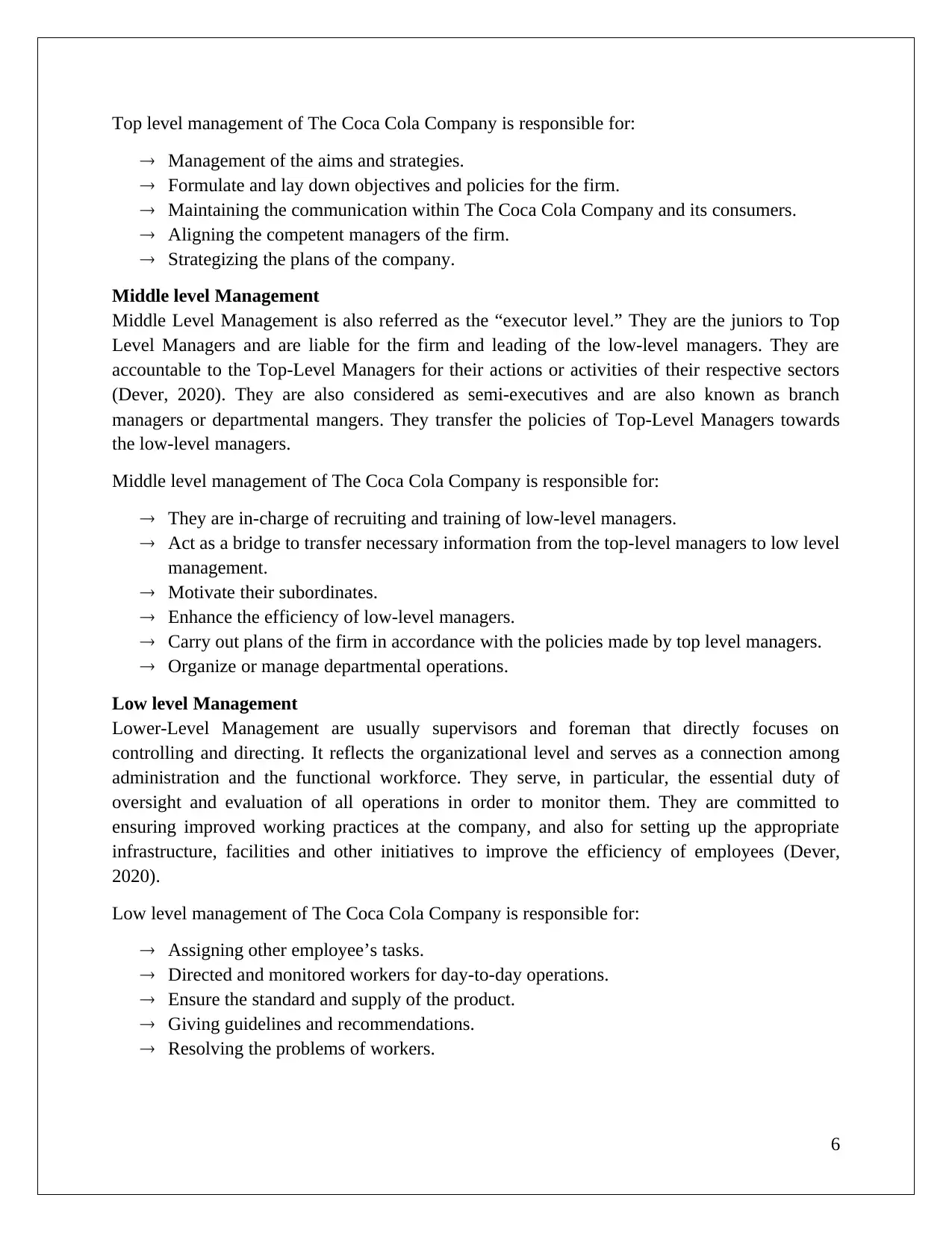
Top level management of The Coca Cola Company is responsible for:
Management of the aims and strategies.
Formulate and lay down objectives and policies for the firm.
Maintaining the communication within The Coca Cola Company and its consumers.
Aligning the competent managers of the firm.
Strategizing the plans of the company.
Middle level Management
Middle Level Management is also referred as the “executor level.” They are the juniors to Top
Level Managers and are liable for the firm and leading of the low-level managers. They are
accountable to the Top-Level Managers for their actions or activities of their respective sectors
(Dever, 2020). They are also considered as semi-executives and are also known as branch
managers or departmental mangers. They transfer the policies of Top-Level Managers towards
the low-level managers.
Middle level management of The Coca Cola Company is responsible for:
They are in-charge of recruiting and training of low-level managers.
Act as a bridge to transfer necessary information from the top-level managers to low level
management.
Motivate their subordinates.
Enhance the efficiency of low-level managers.
Carry out plans of the firm in accordance with the policies made by top level managers.
Organize or manage departmental operations.
Low level Management
Lower-Level Management are usually supervisors and foreman that directly focuses on
controlling and directing. It reflects the organizational level and serves as a connection among
administration and the functional workforce. They serve, in particular, the essential duty of
oversight and evaluation of all operations in order to monitor them. They are committed to
ensuring improved working practices at the company, and also for setting up the appropriate
infrastructure, facilities and other initiatives to improve the efficiency of employees (Dever,
2020).
Low level management of The Coca Cola Company is responsible for:
Assigning other employee’s tasks.
Directed and monitored workers for day-to-day operations.
Ensure the standard and supply of the product.
Giving guidelines and recommendations.
Resolving the problems of workers.
6
Management of the aims and strategies.
Formulate and lay down objectives and policies for the firm.
Maintaining the communication within The Coca Cola Company and its consumers.
Aligning the competent managers of the firm.
Strategizing the plans of the company.
Middle level Management
Middle Level Management is also referred as the “executor level.” They are the juniors to Top
Level Managers and are liable for the firm and leading of the low-level managers. They are
accountable to the Top-Level Managers for their actions or activities of their respective sectors
(Dever, 2020). They are also considered as semi-executives and are also known as branch
managers or departmental mangers. They transfer the policies of Top-Level Managers towards
the low-level managers.
Middle level management of The Coca Cola Company is responsible for:
They are in-charge of recruiting and training of low-level managers.
Act as a bridge to transfer necessary information from the top-level managers to low level
management.
Motivate their subordinates.
Enhance the efficiency of low-level managers.
Carry out plans of the firm in accordance with the policies made by top level managers.
Organize or manage departmental operations.
Low level Management
Lower-Level Management are usually supervisors and foreman that directly focuses on
controlling and directing. It reflects the organizational level and serves as a connection among
administration and the functional workforce. They serve, in particular, the essential duty of
oversight and evaluation of all operations in order to monitor them. They are committed to
ensuring improved working practices at the company, and also for setting up the appropriate
infrastructure, facilities and other initiatives to improve the efficiency of employees (Dever,
2020).
Low level management of The Coca Cola Company is responsible for:
Assigning other employee’s tasks.
Directed and monitored workers for day-to-day operations.
Ensure the standard and supply of the product.
Giving guidelines and recommendations.
Resolving the problems of workers.
6
⊘ This is a preview!⊘
Do you want full access?
Subscribe today to unlock all pages.

Trusted by 1+ million students worldwide
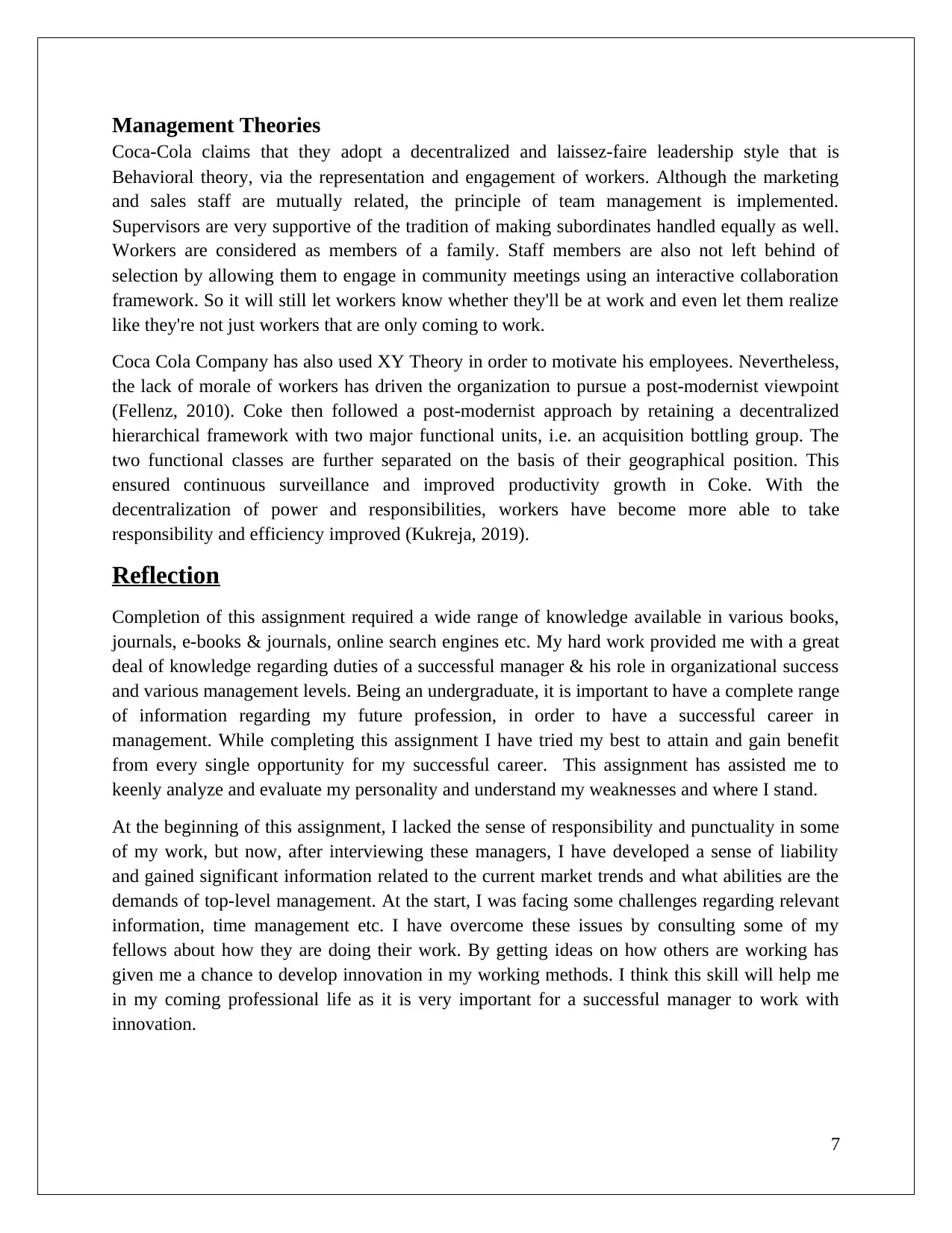
Management Theories
Coca-Cola claims that they adopt a decentralized and laissez-faire leadership style that is
Behavioral theory, via the representation and engagement of workers. Although the marketing
and sales staff are mutually related, the principle of team management is implemented.
Supervisors are very supportive of the tradition of making subordinates handled equally as well.
Workers are considered as members of a family. Staff members are also not left behind of
selection by allowing them to engage in community meetings using an interactive collaboration
framework. So it will still let workers know whether they'll be at work and even let them realize
like they're not just workers that are only coming to work.
Coca Cola Company has also used XY Theory in order to motivate his employees. Nevertheless,
the lack of morale of workers has driven the organization to pursue a post-modernist viewpoint
(Fellenz, 2010). Coke then followed a post-modernist approach by retaining a decentralized
hierarchical framework with two major functional units, i.e. an acquisition bottling group. The
two functional classes are further separated on the basis of their geographical position. This
ensured continuous surveillance and improved productivity growth in Coke. With the
decentralization of power and responsibilities, workers have become more able to take
responsibility and efficiency improved (Kukreja, 2019).
Reflection
Completion of this assignment required a wide range of knowledge available in various books,
journals, e-books & journals, online search engines etc. My hard work provided me with a great
deal of knowledge regarding duties of a successful manager & his role in organizational success
and various management levels. Being an undergraduate, it is important to have a complete range
of information regarding my future profession, in order to have a successful career in
management. While completing this assignment I have tried my best to attain and gain benefit
from every single opportunity for my successful career. This assignment has assisted me to
keenly analyze and evaluate my personality and understand my weaknesses and where I stand.
At the beginning of this assignment, I lacked the sense of responsibility and punctuality in some
of my work, but now, after interviewing these managers, I have developed a sense of liability
and gained significant information related to the current market trends and what abilities are the
demands of top-level management. At the start, I was facing some challenges regarding relevant
information, time management etc. I have overcome these issues by consulting some of my
fellows about how they are doing their work. By getting ideas on how others are working has
given me a chance to develop innovation in my working methods. I think this skill will help me
in my coming professional life as it is very important for a successful manager to work with
innovation.
7
Coca-Cola claims that they adopt a decentralized and laissez-faire leadership style that is
Behavioral theory, via the representation and engagement of workers. Although the marketing
and sales staff are mutually related, the principle of team management is implemented.
Supervisors are very supportive of the tradition of making subordinates handled equally as well.
Workers are considered as members of a family. Staff members are also not left behind of
selection by allowing them to engage in community meetings using an interactive collaboration
framework. So it will still let workers know whether they'll be at work and even let them realize
like they're not just workers that are only coming to work.
Coca Cola Company has also used XY Theory in order to motivate his employees. Nevertheless,
the lack of morale of workers has driven the organization to pursue a post-modernist viewpoint
(Fellenz, 2010). Coke then followed a post-modernist approach by retaining a decentralized
hierarchical framework with two major functional units, i.e. an acquisition bottling group. The
two functional classes are further separated on the basis of their geographical position. This
ensured continuous surveillance and improved productivity growth in Coke. With the
decentralization of power and responsibilities, workers have become more able to take
responsibility and efficiency improved (Kukreja, 2019).
Reflection
Completion of this assignment required a wide range of knowledge available in various books,
journals, e-books & journals, online search engines etc. My hard work provided me with a great
deal of knowledge regarding duties of a successful manager & his role in organizational success
and various management levels. Being an undergraduate, it is important to have a complete range
of information regarding my future profession, in order to have a successful career in
management. While completing this assignment I have tried my best to attain and gain benefit
from every single opportunity for my successful career. This assignment has assisted me to
keenly analyze and evaluate my personality and understand my weaknesses and where I stand.
At the beginning of this assignment, I lacked the sense of responsibility and punctuality in some
of my work, but now, after interviewing these managers, I have developed a sense of liability
and gained significant information related to the current market trends and what abilities are the
demands of top-level management. At the start, I was facing some challenges regarding relevant
information, time management etc. I have overcome these issues by consulting some of my
fellows about how they are doing their work. By getting ideas on how others are working has
given me a chance to develop innovation in my working methods. I think this skill will help me
in my coming professional life as it is very important for a successful manager to work with
innovation.
7
Paraphrase This Document
Need a fresh take? Get an instant paraphrase of this document with our AI Paraphraser
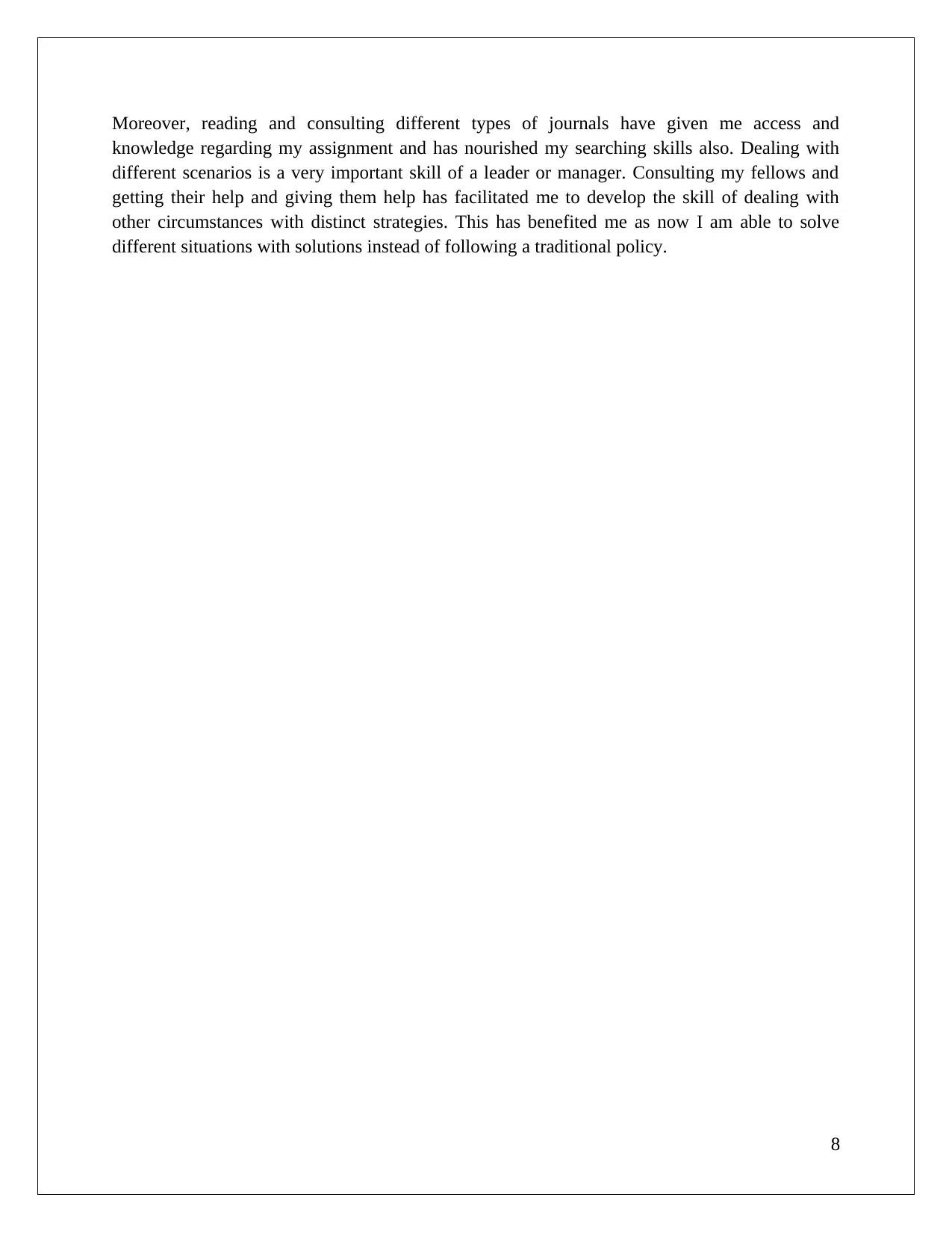
Moreover, reading and consulting different types of journals have given me access and
knowledge regarding my assignment and has nourished my searching skills also. Dealing with
different scenarios is a very important skill of a leader or manager. Consulting my fellows and
getting their help and giving them help has facilitated me to develop the skill of dealing with
other circumstances with distinct strategies. This has benefited me as now I am able to solve
different situations with solutions instead of following a traditional policy.
8
knowledge regarding my assignment and has nourished my searching skills also. Dealing with
different scenarios is a very important skill of a leader or manager. Consulting my fellows and
getting their help and giving them help has facilitated me to develop the skill of dealing with
other circumstances with distinct strategies. This has benefited me as now I am able to solve
different situations with solutions instead of following a traditional policy.
8
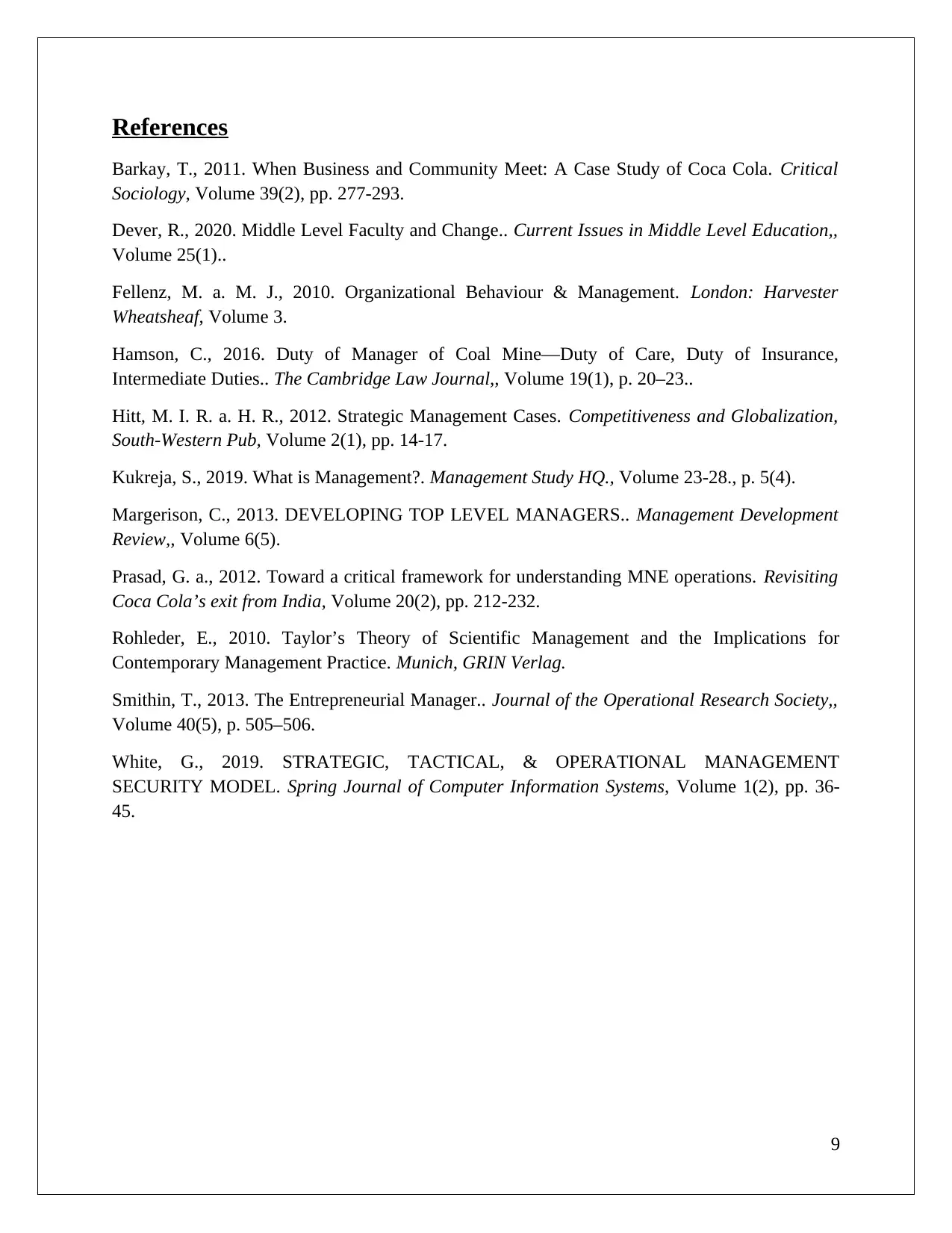
References
Barkay, T., 2011. When Business and Community Meet: A Case Study of Coca Cola. Critical
Sociology, Volume 39(2), pp. 277-293.
Dever, R., 2020. Middle Level Faculty and Change.. Current Issues in Middle Level Education,,
Volume 25(1)..
Fellenz, M. a. M. J., 2010. Organizational Behaviour & Management. London: Harvester
Wheatsheaf, Volume 3.
Hamson, C., 2016. Duty of Manager of Coal Mine—Duty of Care, Duty of Insurance,
Intermediate Duties.. The Cambridge Law Journal,, Volume 19(1), p. 20–23..
Hitt, M. I. R. a. H. R., 2012. Strategic Management Cases. Competitiveness and Globalization,
South-Western Pub, Volume 2(1), pp. 14-17.
Kukreja, S., 2019. What is Management?. Management Study HQ., Volume 23-28., p. 5(4).
Margerison, C., 2013. DEVELOPING TOP LEVEL MANAGERS.. Management Development
Review,, Volume 6(5).
Prasad, G. a., 2012. Toward a critical framework for understanding MNE operations. Revisiting
Coca Cola’s exit from India, Volume 20(2), pp. 212-232.
Rohleder, E., 2010. Taylor’s Theory of Scientific Management and the Implications for
Contemporary Management Practice. Munich, GRIN Verlag.
Smithin, T., 2013. The Entrepreneurial Manager.. Journal of the Operational Research Society,,
Volume 40(5), p. 505–506.
White, G., 2019. STRATEGIC, TACTICAL, & OPERATIONAL MANAGEMENT
SECURITY MODEL. Spring Journal of Computer Information Systems, Volume 1(2), pp. 36-
45.
9
Barkay, T., 2011. When Business and Community Meet: A Case Study of Coca Cola. Critical
Sociology, Volume 39(2), pp. 277-293.
Dever, R., 2020. Middle Level Faculty and Change.. Current Issues in Middle Level Education,,
Volume 25(1)..
Fellenz, M. a. M. J., 2010. Organizational Behaviour & Management. London: Harvester
Wheatsheaf, Volume 3.
Hamson, C., 2016. Duty of Manager of Coal Mine—Duty of Care, Duty of Insurance,
Intermediate Duties.. The Cambridge Law Journal,, Volume 19(1), p. 20–23..
Hitt, M. I. R. a. H. R., 2012. Strategic Management Cases. Competitiveness and Globalization,
South-Western Pub, Volume 2(1), pp. 14-17.
Kukreja, S., 2019. What is Management?. Management Study HQ., Volume 23-28., p. 5(4).
Margerison, C., 2013. DEVELOPING TOP LEVEL MANAGERS.. Management Development
Review,, Volume 6(5).
Prasad, G. a., 2012. Toward a critical framework for understanding MNE operations. Revisiting
Coca Cola’s exit from India, Volume 20(2), pp. 212-232.
Rohleder, E., 2010. Taylor’s Theory of Scientific Management and the Implications for
Contemporary Management Practice. Munich, GRIN Verlag.
Smithin, T., 2013. The Entrepreneurial Manager.. Journal of the Operational Research Society,,
Volume 40(5), p. 505–506.
White, G., 2019. STRATEGIC, TACTICAL, & OPERATIONAL MANAGEMENT
SECURITY MODEL. Spring Journal of Computer Information Systems, Volume 1(2), pp. 36-
45.
9
⊘ This is a preview!⊘
Do you want full access?
Subscribe today to unlock all pages.

Trusted by 1+ million students worldwide
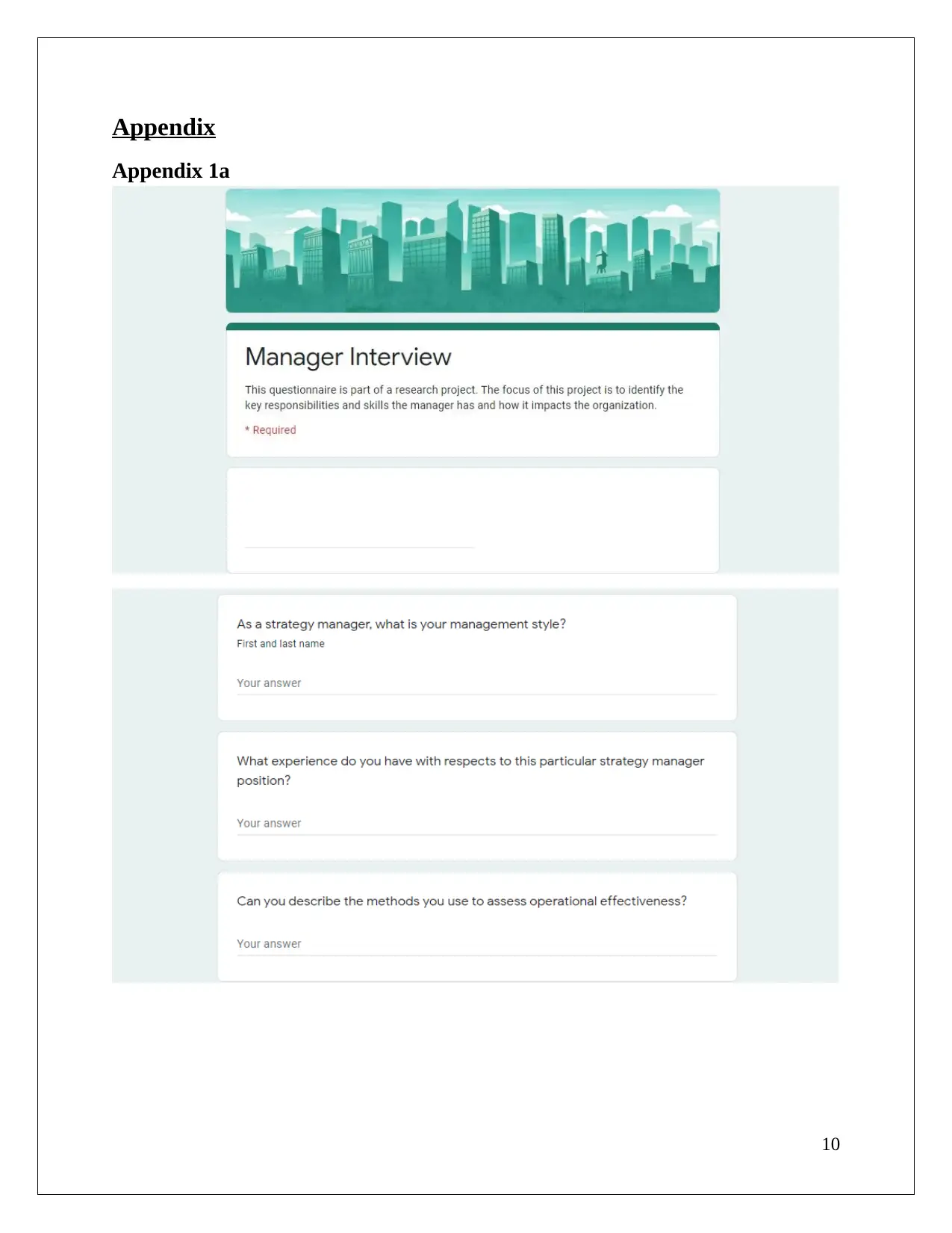
Appendix
Appendix 1a
10
Appendix 1a
10
Paraphrase This Document
Need a fresh take? Get an instant paraphrase of this document with our AI Paraphraser
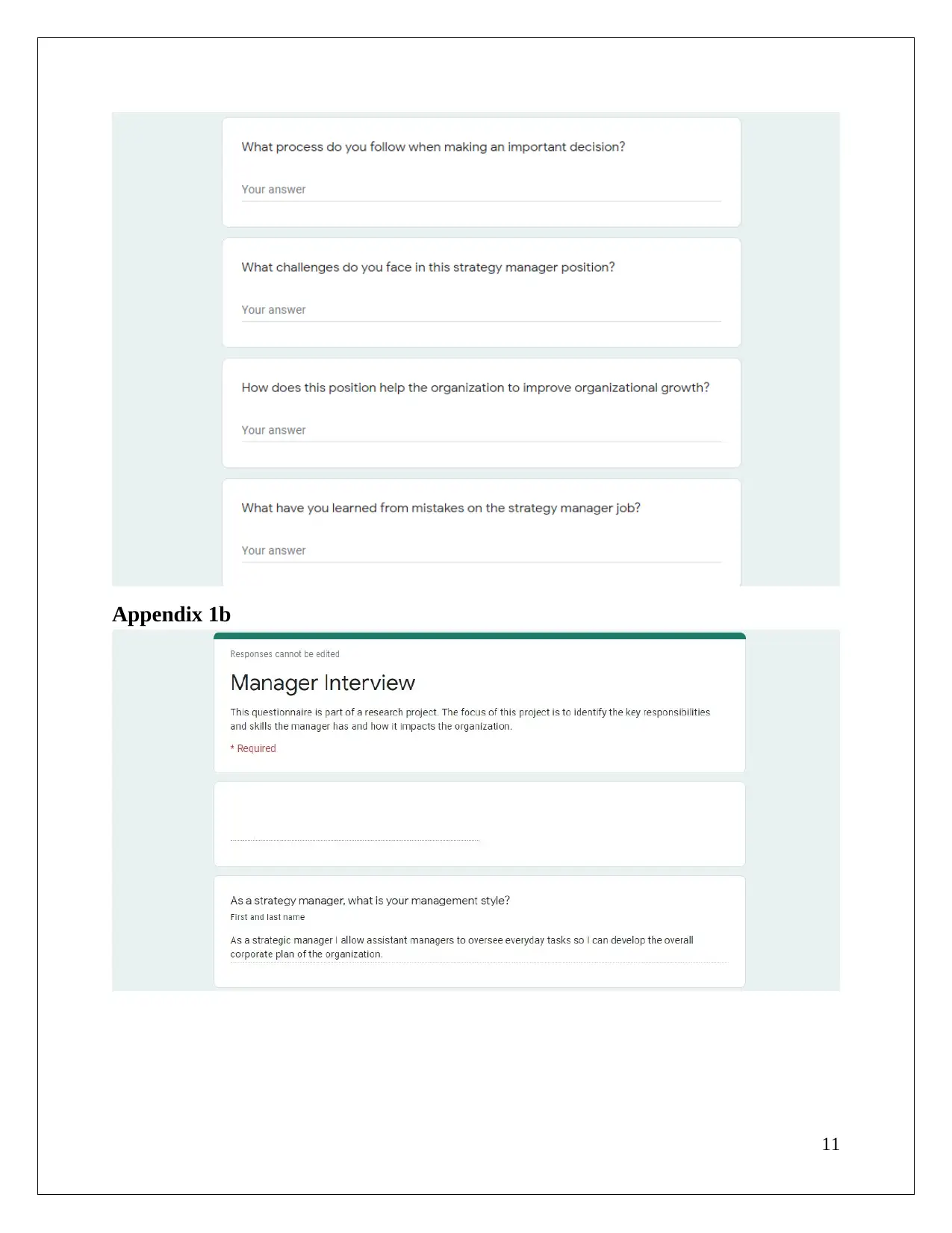
Appendix 1b
11
11
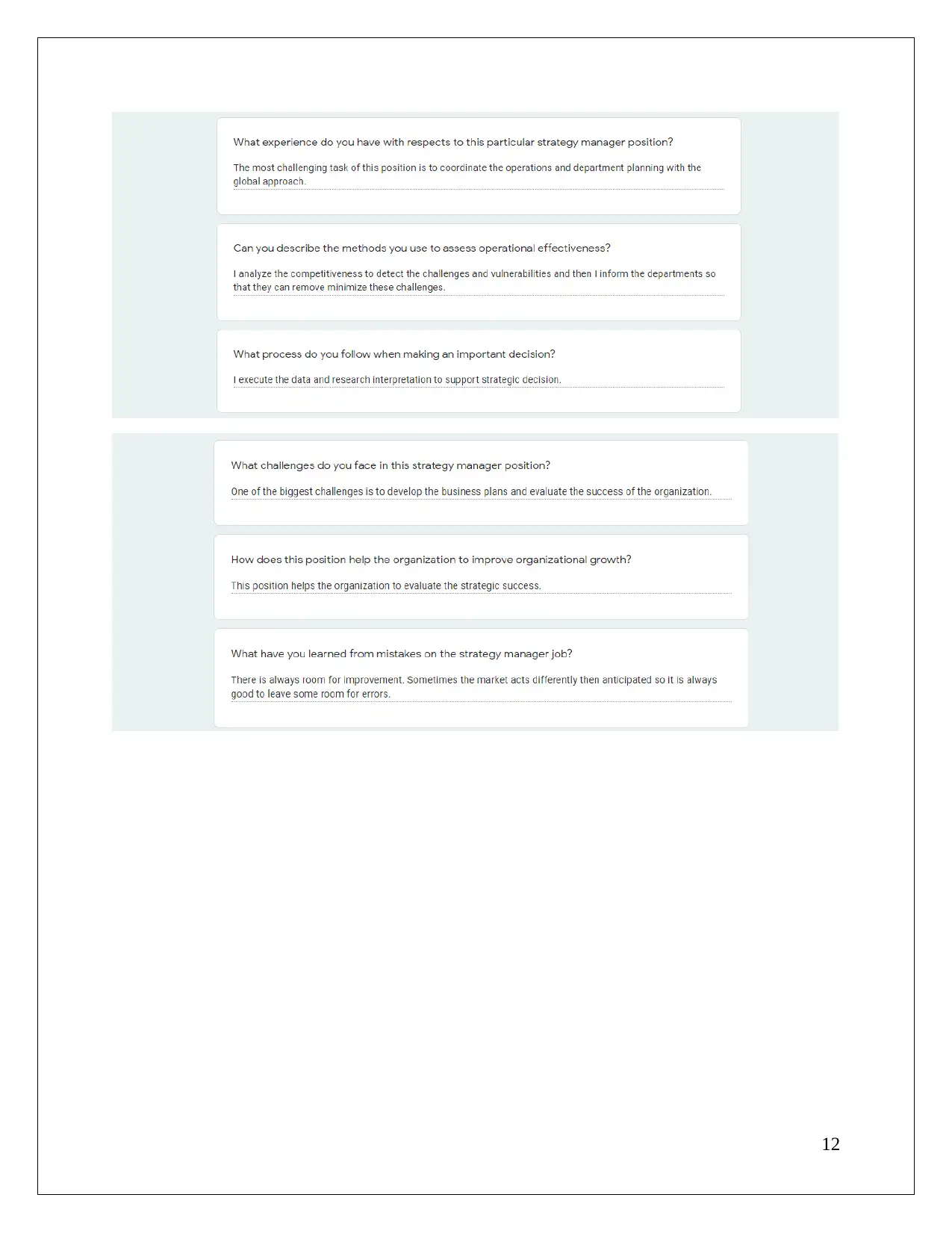
12
⊘ This is a preview!⊘
Do you want full access?
Subscribe today to unlock all pages.

Trusted by 1+ million students worldwide
1 out of 18
Related Documents
Your All-in-One AI-Powered Toolkit for Academic Success.
+13062052269
info@desklib.com
Available 24*7 on WhatsApp / Email
![[object Object]](/_next/static/media/star-bottom.7253800d.svg)
Unlock your academic potential
Copyright © 2020–2026 A2Z Services. All Rights Reserved. Developed and managed by ZUCOL.




